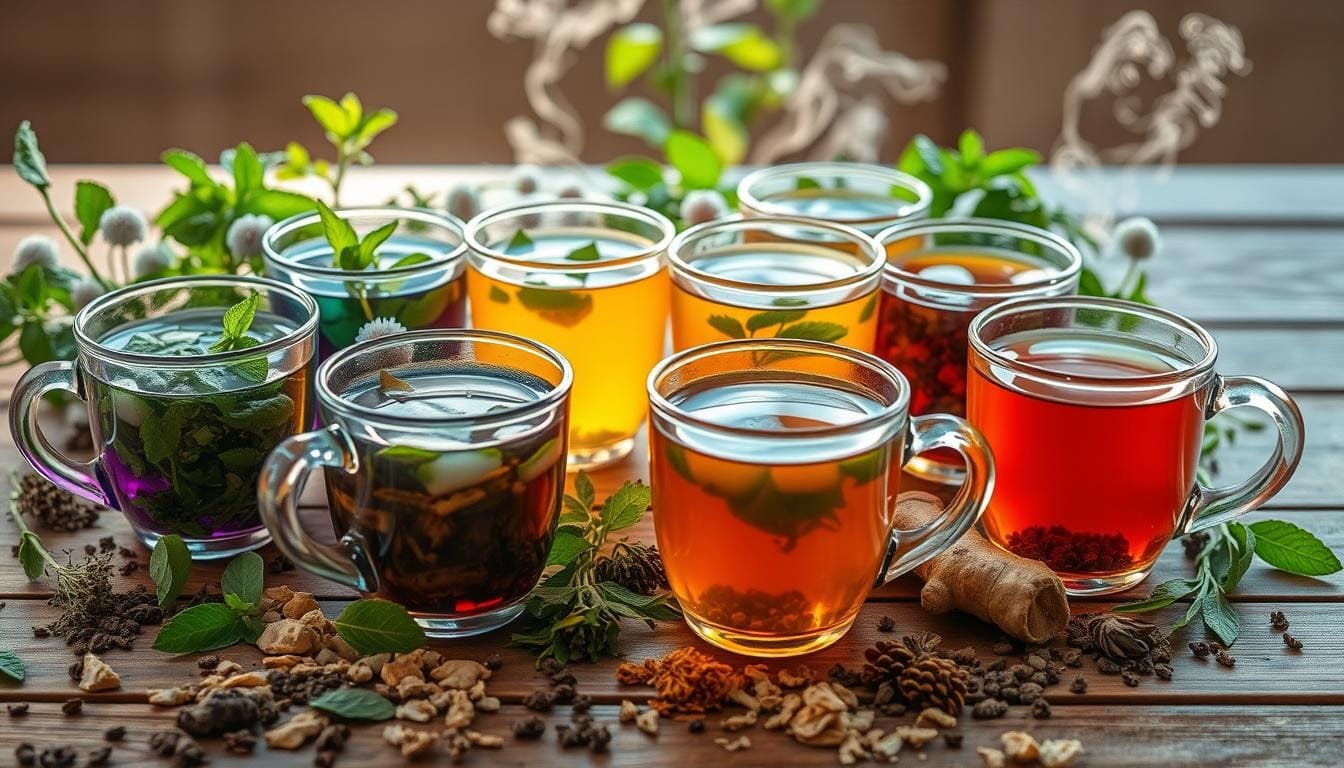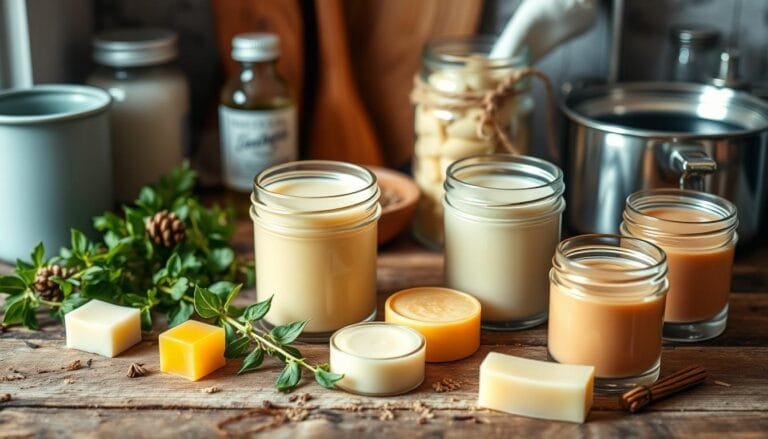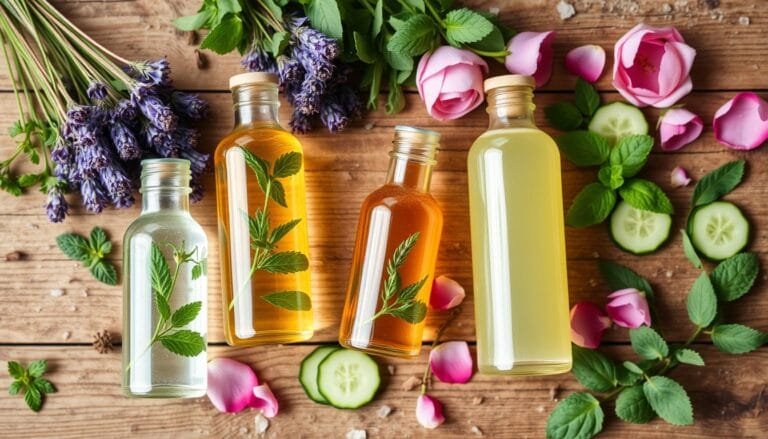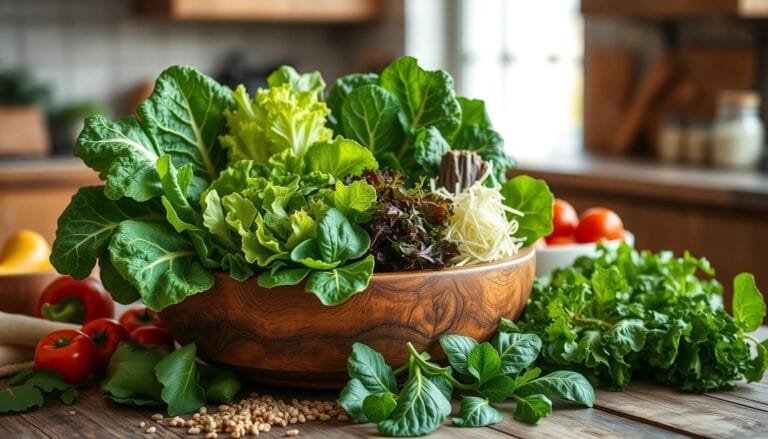I’ve struggled with digestive issues and found relief in herbal teas. These teas have been used for centuries to ease stomach troubles. They include peppermint, ginger, fennel, and chamomile, helping with nausea, bloating, and constipation.
This article explores the history and science behind these teas’ benefits. I’ll also share tips on brewing the perfect cup. These teas are a tasty way to support your digestive health, whether you face occasional stomach issues or want to boost your gut health.
Understanding the Power of Herbal Teas for Digestive Health
Herbal teas have been a key part of traditional medicine for centuries. They help with digestive health in many ways. From reducing inflammation to soothing the digestive tract, their benefits are impressive.
History of Herbal Tea Usage in Digestive Care
Herbal teas are valued worldwide for digestive issues. They come from ancient traditions in India, China, and the Middle East. For example, peppermint tea has helped with bloating and pain for centuries.
How Herbal Teas Support Digestive Function
Herbs and spices in herbal teas have unique benefits. Peppermint’s menthol relaxes digestive muscles, easing cramps. Turmeric’s curcumin fights inflammation, helping digestion.
Scientific Evidence Behind Tea Benefits
Many studies have looked into herbal tea benefits. They show teas like green and lemon tea boost gut health. Ginger tea, for example, helps with indigestion and bloating.
“Herbal teas have been used for centuries to support digestive health, and scientific research continues to uncover the remarkable ways in which they can improve digestive function and alleviate a variety of gastrointestinal issues.”
Exploring herbal teas’ history and science reveals their value. They offer a natural way to tackle digestive problems.
Peppermint Tea: A Natural Solution for Digestive Discomfort
Looking for a natural way to ease digestive issues? Peppermint tea is your answer. It’s packed with menthol, which is great for your stomach.
Peppermint tea can help with bloating, diarrhea, and constipation. It also eases stomach and pelvic pain. Mint leaves have many health benefits, including fighting off infections and inflammation.
It’s a big help for people with irritable bowel syndrome (IBS). It can reduce stomach pain and improve bowel habits. A study showed peppermint tea cuts down on abdominal pain in kids.
But there’s more. Peppermint tea can also ease flatulence, morning sickness, and improve digestion. It can even help you relax, sleep better, and feel more alert. Drinking it before bed is a great way to calm your stomach.
To brew the perfect peppermint tea, use 7-10 fresh leaves or 1 tea bag in boiling water for 10 minutes. While there’s not much research on peppermint tea, it’s thought to work like peppermint oil. Peppermint oil can reduce IBS symptoms by 40% in just 4 weeks.
So, if you want to ease your digestive issues naturally, try peppermint tea. Your stomach will appreciate it!
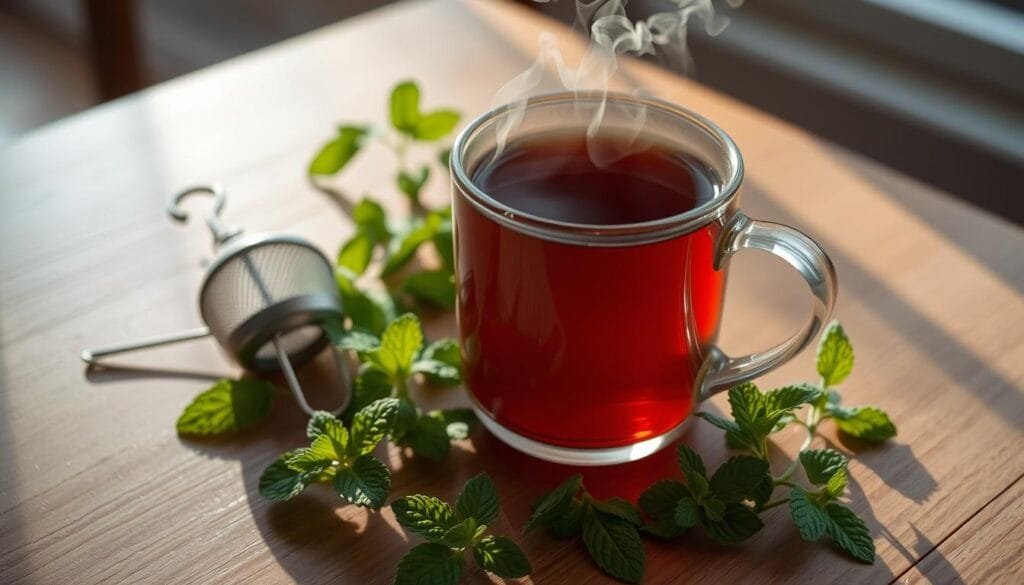
Ginger Tea: The Ancient Remedy for Nausea and Indigestion
Ginger is a powerful root with a long history in traditional medicine. It’s packed with compounds like gingerols and shogaols. These help stimulate stomach contractions and emptying, making ginger tea great for nausea and indigestion.
Preparation Methods for Maximum Benefits
To make a soothing ginger tea, add 2 tablespoons of fresh ginger root to 2 cups of boiling water. Let it steep for 10-20 minutes to get the most benefits. For a bit more flavor, add a squeeze of lemon or a drizzle of honey.
Recommended Dosage and Timing
Studies show that 2-6 grams of ginger a day can help your digestion. That’s about 1 teaspoon of grated ginger or 4 cups of ginger tea. Drinking it before or after meals can ease nausea, vomiting, and indigestion.
Combining Ginger with Other Herbs
Adding other herbs to ginger tea can make it even better. Try mixing it with peppermint, fennel, or chamomile. These herbs work together to help with nausea, bloating, and stomach pain.
“Ginger has been used for centuries to treat a variety of digestive issues, from nausea to indigestion. Its active compounds work to stimulate the stomach and promote healthy digestion.”
Ginger tea is a safe and effective natural remedy for digestive issues. Add it to your daily routine and enjoy the ancient benefits of this powerful root.
Fennel Tea: Relief for Bloating and Gas
If you’re dealing with bloating and gas, try a cup of fennel tea. It’s made from fennel seeds and has been helping with digestion for centuries.
Fennel tea is full of good stuff like antioxidants and vitamins A, B, C, and D. It might even help with inflammation and eye health, like treating glaucoma.
Fennel tea is great for easing bloating and gas. Drinking it every day can help with bowel movements in older adults. It can also help with constipation and keep digestion regular.
To make fennel tea, boil water and add 1 teaspoon of fennel seeds. Let it steep for 5-10 minutes. Its licorice-like taste and anti-inflammatory properties can help with stomach pain and keep your digestive system healthy.
“Fennel tea has been used traditionally for centuries to treat digestive issues like bloating and gas.”
Adding fennel tea to your daily routine can help with bloating and gas. It’s good for your health and tastes nice. This herbal tea is a great choice for anyone looking to improve their digestion.
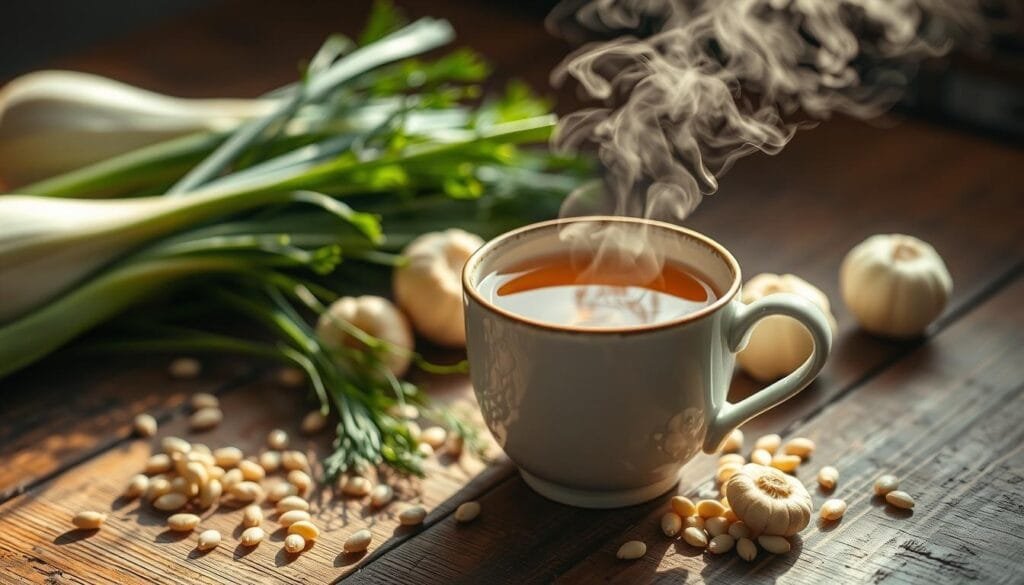
| Nutrient | Amount in Fennel Tea |
|---|---|
| Antioxidants | High |
| Vitamin A | Moderate |
| Vitamin B-complex | Moderate |
| Vitamin C | High |
| Vitamin D | Moderate |
Chamomile Tea: Soothing Properties for Stomach Issues
Looking for natural relief for your stomach troubles? Try a soothing cup of chamomile tea. This ancient herbal remedy calms the stomach and brings digestive peace. Its anti-inflammatory properties can reduce bloating and ease stomach cramps.
It’s a top choice for acid reflux, indigestion, or other stomach discomforts.
Best Times to Drink Chamomile Tea
For the best digestive health benefits, drink chamomile tea after meals or before bed. Its calming effects help your body absorb nutrients better. It also relaxes the digestive tract and eases stomach tension.
Combining with Other Calming Herbs
For a stronger digestive elixir, mix chamomile with calming herbs like lemongrass, lemon verbena, or mint. These herbs boost chamomile’s soothing and anti-inflammatory effects. They offer stress relief and promote digestive calm. Try different herbal mixes to find your perfect brew.
“Chamomile tea is one of the oldest herbs used in ancient traditional medicine, and it’s become a staple for its calming and digestive benefits.”
More research is needed to fully understand chamomile tea’s effects on acid reflux and digestive issues. But, the current evidence suggests it’s a natural remedy worth trying. Always talk to your healthcare provider before trying herbal supplements, as they may interact with medications or cause allergies.
Marshmallow Root Tea: Protection for Digestive Tract
Looking for natural ways to ease your digestive issues? Marshmallow root tea could be a good choice. This herb is packed with benefits for your digestive health. It has polysaccharides that help make mucus in your gut, protecting it from irritation and ulcers.
A 2014 study on animals showed that marshmallow root extract might help with metabolism. While more research is needed, the current findings suggest it could be a great addition to your health routine.
To make a soothing marshmallow root tea, steep 1 tablespoon of dried root in 1 cup of boiling water for 5-10 minutes. The root’s mucilage makes the water smooth and comforting.
Marshmallow root has been used in herbal medicine for centuries. Research on marshmallow root mainly involves animal studies and small-scale human studies, indicating a need for more substantial human research to confirm its effectiveness.
Marshmallow root is generally safe for adults but can interact with some medications. Always talk to your healthcare provider before trying it.
Want to soothe your digestive tract and protect it? Try adding marshmallow root tea to your daily routine. With its unique benefits and long history, this gentle herb might be what you’ve been looking for.
Traditional Spice Blend Teas for Enhanced Digestion
Traditional spice blend teas are known for their digestive benefits. They use a mix of cardamom and cinnamon and Ayurvedic herbs. These spice teas offer a wealth of digestive advantages.
Cardamom and Cinnamon Combinations
Cardamom and cinnamon are two spices that boost digestion when combined. Cardamom helps make digestive enzymes, breaking down food. Cinnamon, with its anti-inflammatory properties, soothes the gut and eases discomfort.
Together, they make a tea that warms and calms the stomach. It also helps with regular bowel movements.
Ayurvedic Digestive Blends
Ayurvedic blends come from ancient Indian science. They mix spices like fennel, cumin, and coriander. These herbs activate the digestive system, reducing bloating and gas.
One example is Yogi Stomach Ease tea. It combines Ayurvedic spices with peppermint and licorice root. This blend is a soothing and effective digestive aid.
| Spice Tea | Key Digestive Benefits |
|---|---|
| Cardamom and Cinnamon | Stimulates digestive enzymes, soothes the gut, and promotes regular bowel movements. |
| Ayurvedic Blends | Activate the digestive tract, reduce bloating and gas, and support overall gut health. |
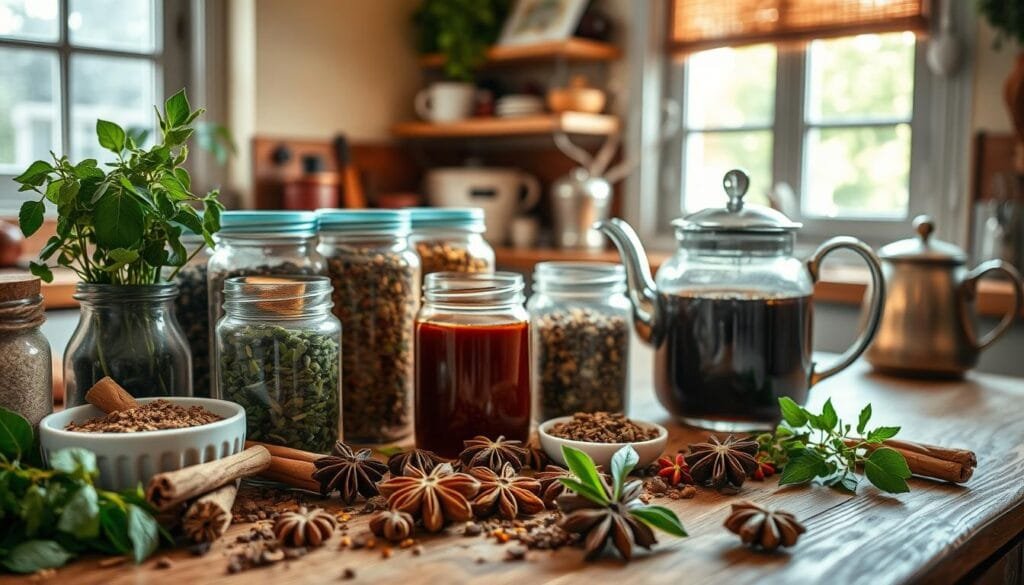
“Spice teas have been used for centuries to aid digestion and soothe the gut. By incorporating these flavorful blends into your daily routine, you can naturally support your digestive health and find relief from common discomforts.”
Making the Perfect Digestive Tea Blend at Home
Making your own digestive tea blends is a great way to use nature’s herbs for your gut health. You can mix different herbs to make teas that fit your needs and taste. Let’s see how to make a perfect digestive tea blend at home.
A simple blend is peppermint, cardamom, and honey. Crush a few cardamom pods to get their oils. Add fresh peppermint sprigs. Steep them in hot water for 5-10 minutes. Then, add raw honey for a soothing tea.
For a spicy tea, mix fresh ginger, fennel seeds, cinnamon, and lemon slices. Boil it, then simmer for 10 minutes. This extracts the best flavors and benefits from the herbs and spices.
| Ingredient | Quantity | Health Benefits |
|---|---|---|
| Peppermint | 1 tsp dried leaves | Soothes the digestive tract, relieves gas and bloating |
| Fenugreek | 1 tsp dried seeds | Reduces acid reflux, aids in eliminating toxins |
| Lemon Balm | 1 tsp dried leaves | Relieves dyspepsia and stomach discomfort |
| Lemon | 1/2 slice | Supports digestion and provides vitamin C |
| Cinnamon | 1 stick | Regulates blood sugar levels, improves nutrient absorption |
| Honey | 2 tsp (optional) | Natural sweetener with antimicrobial properties |
The secret to the perfect digestive tea blend is to try different recipes. Use digestive herbs like peppermint, ginger, fennel, and cardamom. Enjoy these homemade tea blends for better digestive health and well-being.
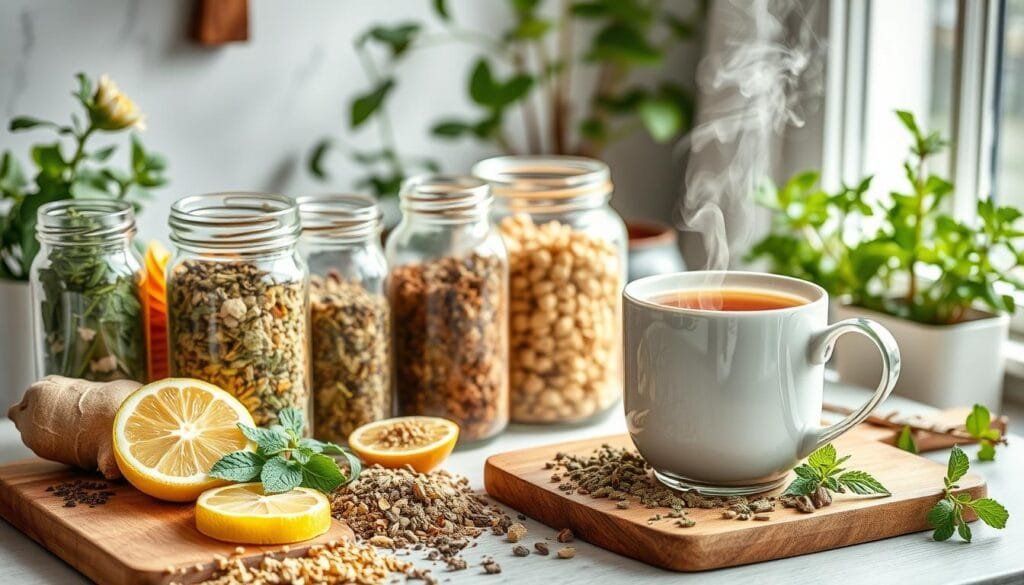
Safety Considerations and Possible Interactions
Herbal teas are usually safe, but it’s important to watch out for herbal tea safety issues and medication interactions. Some teas might have side effects or not be good for people with certain health problems.
For example, peppermint tea might make acid reflux worse for some. Always talk to a doctor before using herbal teas for health reasons, if you’re on meds or have ongoing health issues.
Potential Herbal Tea Interactions
- Some meds, like antidepressants, antihistamines, and pain relievers, can cause constipation. Herbal laxative teas like senna or cascara might make this worse.
- Teas with goldenseal or St. John’s wort might change how well your prescription meds work or how safe they are.
- Curcumin in turmeric tea can raise levels of some meds, like sulfasalazine, because it affects the CYP1A2 enzyme.
- Ginkgo tea might increase bleeding risk when taken with blood-thinning meds like warfarin.
| Herbal Supplement | Potential Medication Interactions |
|---|---|
| Black Cohosh | Statin medications |
| Cranberry | Less likely to have clinically important drug interactions |
| Garlic | Drugs transported by P-gp |
| Ginkgo | Warfarin, increasing bleeding risk |
Always talk to a healthcare professional before adding herbal teas to your routine, if you’re on meds or have health issues. Knowing about herbal tea safety and medication interactions helps you enjoy herbal teas safely and keep your health in check.
Creating a Daily Tea Ritual for Digestive Wellness
Adding a daily tea ritual to your routine can greatly improve your digestive health. Drinking tea regularly supports your gut and boosts overall wellness. Begin your day with ginger or peppermint tea to kickstart digestion and energize you.
These teas can ease nausea, bloating, and indigestion. As the day goes on, take a break with a cup of chamomile tea after meals. It calms the stomach and aids digestion. Try different teas to find what works best for you.
Morning Routine Recommendations
- Start your day with a cup of ginger or peppermint tea to stimulate digestion.
- Incorporate lemon balm or ashwagandha for an added energy boost and mental clarity.
- Enjoy a cup of green tea or oolong tea to support healthy metabolism and weight management.
Post-Meal Tea Timing
After meals, try chamomile or lavender tea for easier digestion and calmness. These teas are great in the evening for better sleep and well-being.
Experiment and stick to your tea ritual for better digestion. Find the teas that suit your body and make them a regular part of your day. Let these natural remedies nourish your digestive health.
Natural Tea Remedies for Common Digestive Issues
As a tea lover, I’ve found that herbal teas can really help with digestive problems. Senna tea, with sennosides, can help with constipation by promoting regular bowel movements. Chamomile or marshmallow root tea can soothe acid reflux.
Peppermint or ginger tea is great for nausea and indigestion. Peppermint’s menthol calms the stomach, while ginger helps settle it and ease discomfort. Fennel tea is also helpful for bloating and gas, as it boosts digestive juices and enzymes.
When trying new herbal remedies, start with small amounts and watch how your body reacts. Always talk to a healthcare professional if you have health concerns. Adding these natural teas to your routine can help support your digestive health and ease common issues.
